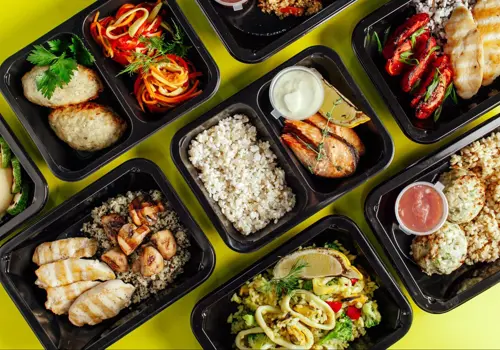What is Clean Eating?
Clean eating is a practice that involves consuming whole, nutrient-dense foods that are as close to their natural state as possible. This nutrition-packed approach to eating is an essential part of a fitness journey and offers a diverse array of benefits, from improved digestion and increased energy levels to better heart and brain health.
By cutting out highly processed snacks and packaged food and incorporating whole grains, fruits and vegetables, lean protein, and healthy fats, clean eating can help you achieve and maintain a healthy weight while nourishing your body with wholesome, nutrient-rich foods.
Understanding Clean Eating
Clean eating can mean something different to everyone. For some, it simply means minimizing their consumption of processed foods. For others, it goes as far as eating the foods as close to their natural state as possible, making meals from scratch to remain conscious of all ingredients going into each meal.
As a whole, it’s the practice of eating foods that are as close to their natural state as possible, making them “cleaner” than the ultra-processed foods and meals on grocery store shelves. It allows you to nourish your body with wholesome, nutrient-dense foods that benefit your body in an assortment of ways.
Benefits of Clean Eating
The benefits of clean eating are far-reaching, from supporting your body in health and wellbeing to potentially helping you live longer. According to the CDC, healthy eating can offer the following benefits:
- Healthier skin, teeth, and eyes
- Muscle support
- Stronger bones
- May help you live longer
- Boost immunity
- Lower risk of some cancers, heart disease, and type 2 diabetes
- Support digestive health
- Support healthy pregnancies and breastfeeding
- Help achieve and maintain a healthy weight
- Improve heart and brain health
- Increase energy levels
How to Start Clean Eating
The practice of clean eating involves cutting out highly processed snacks and packaged food, so if you want to begin eating cleaner, start there. Trade out the ready-made, ultra-processed foods for nutrition in its natural state.
Here are a few tips to help you begin your clean-eating journey:
Whole Grains
Whole-grain foods are an excellent addition to a healthy diet and an integral part of clean eating. These grains offer an assortment of fiber, vitamins, minerals, and similar nutrients, which can help control weight, cholesterol levels, and blood pressure.
Black, brown, red, and wild rice, oatmeal, popcorn, whole-wheat flour, and whole-grain cereals, bread, pasta, and crackers are outstanding whole grains to add to your diet.
Incorporate Whole Fruits and Vegetables
Fruits and vegetables are an excellent source of vitamins, minerals, and dietary fiber, making them a core part of a clean diet. While fruits contain carbohydrates and natural sugars, they’re filling, high in nutrients, and an excellent alternative to processed sweets.
When planning your daily meals and snacks, try to incorporate five servings of fruit and veggies. Get creative with your incorporations to keep things interesting. For example, you could swap your morning snack for a crisp apple with nut butter or whole nuts. Or, add steamed, perfectly seasoned veggies as a side with your dinner. You could even add a serving of peanut butter to a celery stalk, topping it with a few raisins to create the “ants on a log” snack.
Consume Plenty of Lean Protein
While carbohydrates found in whole grains, fruits, and vegetables are your body’s main source of energy, lean protein is an integral part of your diet. Carbs are a quick-burning energy source that powers you through short bursts, but protein offers long-term energy, as it takes longer to digest and utilize.
So, to keep your body energized throughout the day, it’s important to consume plenty of lean protein. You can find lean protein in an assortment of foods, such as boneless skinless chicken breast, white fish, lean beef, plain Greek yogurt, beans, tofu, and farro.
Add Healthy Fats
While fats are often flagged as unhealthy, there’s such a thing as “good” fats. These fats are a far cry from the trans and saturated fats found in high quantities in processed foods. These fats, called monounsaturated and polyunsaturated fats, present a lower disease risk than their “bad” counterparts.
The “good” fats are found in high quantities in foods like nuts, seeds, fish, avocados, eggs, and Greek yogurt. They can make an excellent addition to a healthy diet, but as with any food, it’s important to consume them in moderation.
Make Your Own Meals and Snacks
Many ready-made snacks and meals you might find in the aisles of your local grocery store are packed with unnecessary ingredients, even those claiming to be healthy. Since clean eating is all about eating foods in their natural state, it’s best to minimize your consumption of these processed foods.
Making a total overhaul in your switch to clean eating can be overwhelming, especially if you’re used to eating store-bought meals and snacks. Remember, it’s okay to take it slow and make a gradual, consistent change. Start by swapping out one or two meals per week with a homemade dinner, then increase the number of snacks and meals you make over time.
Talk to a Dietician
Overhauling your diet can be a daunting task, especially if you want to swap processed favorites for natural alternatives. This is where a dietician’s help comes in handy. A dietician can help you determine how much of each food group you should consume in a day based on factors specific to you. Furthermore, they can offer suggestions for healthy swaps, giving you ideas to fulfill your caloric needs each day.
Remember, a healthy diet is half the battle when it comes to a fitness journey, so if you’re unsure what to eat to help you reach your fitness goals, help from a dietician might be precisely what you need.
Complement Clean Eating With a Personalized Exercise Plan
Clean eating and exercise go hand-in-hand, each complementing the other and helping you reach your fitness goals. Once you dial in your nutrition, it might be time to focus on your exercise plan and begin taking the first steps toward reaching your fitness goals.
If you’re ready to kickstart your fitness journey and make the most of your newfound clean eating habits, Svetness can help! Our personal trainers, located nationwide, are ready to help you succeed. Fill out our online contact form to get started today!




